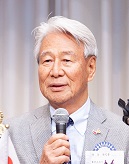What Can We Do for the Next Generation Children?
September 5, 2018
Mr. Einosuke Sumitani
CEO, KCJ GROUP INC.
ˇˇ I had worked in the hospitality business and imported restaurants including Tony RomaˇÇs, Capricciosa, Hard Rock Cafe, WolfgangˇÇs Steakhouse from the USA and rolled them out in Japan.
I had worked in the hospitality business and imported restaurants including Tony RomaˇÇs, Capricciosa, Hard Rock Cafe, WolfgangˇÇs Steakhouse from the USA and rolled them out in Japan.
ˇˇIn a turbulent world we live today, the key words are shortage of resources due to population increases, threat of terrorism, Summit Meeting between the USA and North Korea, ESG investment/SDGs, monopoly by GAFA and cyber terrorism.
ˇˇIn Japan, the declining number of working-age population, the future of virtual currencies, poverty, sluggish economy and particularly work-style reform is worth noting. In 1943, the year I was born, 2.3 million babies were born. It reached 2.7 million in five years, but after the end of the second baby boom period, the number has kept decreasing to hit a record low of 946,000. The working-age population also keeps declining after peaking in 1995, while the lifetime unmarried rate is increasing for both males and females.
ˇˇLooking at Japanese businesses from world ranking, 14 Japanese companies ranked among the list of top 20 in terms of market value in 1989 just before the economic bubble burst. It is unfortunate that no Japanese companies are ranked in this year. They are dominated by American companies, including Apple worth 100 trillion yen in market value, while some Chinese companies are ranked in as newcomers.
ˇˇLooking at the World University Rankings issued by the Times Higher Education in the UK, there are only 2 Japanese Universities among the top 100. As for the number of students studying overseas, the top is China followed by the USA, India and South Korea. Japanese students studying overseas once totaled 82,000 but it dropped to only 57,000 by 2011. English proficiency level is also quite low according to the Ministry of Economics, Trade and Industry data, with the score of TOEFL ranked 135th in the world and 27th among 30 Asian countries.
ˇˇWhile Japan is the second largest contributor after the USA to the United Nations, it is unfortunate that the number of international civil servants from Japan is only 790. There are not many applicants, and they have difficulty passing the screening test. Membership of Boy Scouts also halved to around 80,000 in 20 years, and becomes even lower to total 62,000 if we do not include university and senior high school students.
ˇˇLooking back on the history of 73 years after WW¶that ended in 1945, Japan developed remarkably up to 1990, yet its economy has remained sluggish after that. When we look at the future, the new Emperor will be enthroned next year, the Olympic Games will be held in Tokyo in 2020 and the Maglev train will start operation in 2027. By 2045, it is predicted that the age of singularity will arrive when AI can surpass human intelligence. Scientific advancement and progress in technology are beneficial and welcoming, but I am afraid that innate human capability could degenerate if we fail to take control. What is more, the unique Japanese seniority system and its practice of long-term employment do not always synchronize with the discussion around compliance and governance and the feeling of entrapment prevails.
ˇˇNow, let me talk about KidZania. I happened to encounter KidZania headquartered in Mexico after I retired from the restaurant business. KidZania is a scaled indoor city for the children of the world where they can explore and role play nearly 100 jobs and activities using real world tools and equipment. Its basic concept is ˇČEdutainmentˇÉ (combination of ˇČEducationˇÉ and ˇČEntertainmentˇÉ) and here they acquire concentration, hospitality, challenging spirit, creativity, team work, self-discipline, social skills, significance of working, and vocational outlook. When they complete their task, they are paid in the local currency ˇČKidsˇÉ which can be used to shop or pay for services.
ˇˇThere are 24 KidZanias in 19 countries. In Japan, there are 2, one in Tokyo and the other in Koshien, both of them housed in the commercial facilities named LaLaport. There are 85 sponsor companies, of which 37 sponsor both facilities. In Japan, there were in total 1.54 million visitors in 2017.
ˇˇPassion, critical thinking, creativity and communication are the four abilities economic organizations like Keidanren and JACE expect from job-hunting students. I wonder how they could acquire these skills at school, as there seems to be a gap between these expectations and what they actually learn in schools. When I hear that 30 % of newly-recruited students decide to leave in just three years, I believe it is a serious loss and challenging issue.
ˇˇOur company also conducts High School Internship projects. We sent Japanese senior high school students to Singapore for a week this summer, where they worked as KidZania staff, as we hoped they would acquire the four abilities I mentioned above. Cosmopolitan Campus is a project targeted at junior high school students in which they learn issues related to the environment, population and disparity.
ˇˇAs a regional revitalization project, we assist children gaining experience in their local industry and various jobs in KidZania style. So far, we have conducted this project in Mie Prefecture, Sanjyo City in Niigata Prefecture and Hirado City in Nagasaki Prefecture.
ˇˇAll the initiatives I shared with you today boil down to ˇČpioneering a new way for the next generation childrenˇÉ. Unfortunately, a sense of helplessness is now prevalent in the society. Let us boost an uplifting feeling for young people that if they try, they can make their future bright.